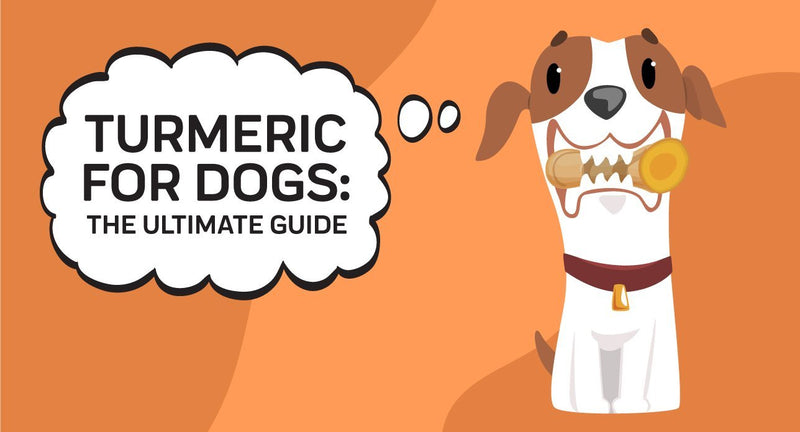- What is Turmeric?
- What is Curcumin?
- Health Benefits of Turmeric for Dogs
- How To Use Turmeric
- Turmeric Dosage
- Turmeric Side Effects
- Turmeric and Hemp Oil
- Final Thoughts On Giving Your Pet Turmeric
When we give our dogs medications and supplements to improve their health, the last thing we want is to hurt them. Many conventional medications are notorious for their harsh side effects, which can in some cases outweigh the intended positives.
Many pet owners refuse to run the risks associated with certain prescription medications and are turning to natural alternatives to avoid harsh side effects. Many natural remedies have no more than a placebo effect on dogs, and some actually have adverse effects, but others have proven powerful health benefits that can promote a better quality of life.
One potent natural remedy that's been used for thousands of years to treat joint pain and arthritis, reduce inflammation, counter blood thinning, strengthen the immune system, and serve as an overall pain relief medicine is turmeric.
Turmeric is a gold powder not unlike ground black pepper that when made into a golden paste (turmeric paste), or administered as turmeric supplements in dog food, can holistically improve your dog's overall health.
What is Turmeric?
Known for its pungent, spicy notes and lavish golden color, turmeric is a natural spice that is used in many common Indian and Thai dishes. A member of the ginger family, turmeric has been used for thousands of years to flavor up food and benefit health.
In 500 BCE, turmeric became a core component in Ayurveda medicine — an ancient Indian form of holistic healing that’s still practiced today.
Today, it’s easy to see why turmeric has been so popular throughout the ages. There are over 6,000 studies that back turmeric's anti inflammatory and antioxidant benefits to humans.
But, turmeric's anti inflammatory properties and powerful antioxidant concentration can support pet care as well.
Turmeric for dogs may be the next step in your pet-parent health journey.
What is Curcumin?
When researching turmeric, you’ll run into the word “curcumin” a lot. The secret to the health benefits of turmeric is all there in the name - "cure cumin." Derived from the same roots and bulbs as cumin, ginger, and curry, curcumin is the active ingredient in turmeric responsible for its many benefits, and its vibrant gold color.
There was a time when natural food was trusted to support human and pet health alike. Many modern medications are like miracle tablets that have saved countless lives, but we shouldn't forget how much a common kitchen staple like olive oil or a simple 1 teaspoon dosage of a natural spice like turmeric, which can be found in everyone's pantry, can support the alleviation of health issues.
And that doesn't even begin to cover pet care.
Health Benefits of Turmeric for Dogs
What isn’t turmeric good for?
Studies have shown that turmeric paste, turmeric supplements, tablets, and the spice itself have many potential health benefits for dogs.
Giving your dog one cup of organic turmeric powder over the course of a year may transform your dog's body from sick to strong.
Here are some of the best health benefits of turmeric for dogs:

Turmeric as a Natural Anti-Inflammatory for Dogs
Inflammation is a blessing and a curse. While it can be extremely painful, inflammation is a natural bodily response that serves a vital function. It kills harmful pathogens like bacteria, toxins, and even heat to protect the body.
Chronic inflammation is often associated with these conditions:
- Arthritis
- Allergies
- Digestive disease
- Kidney disease
- Dental disease
- Cancer
- Neurological disease
Many recent studies have demonstrated the wonderful anti-inflammatory properties of curcumin, one of the substances found in turmeric.
Some studies have found that curcumin can stand right alongside conventional anti-inflammatory drugs and has even outperformed ibuprofen and aspirin.
Turmeric Antioxidant Supplements
Antioxidants are substances that offer cells a protective layer against free radicals.
Free radicals are unstable atoms that tear apart cells and are linked to rapid aging and a lengthy list of diseases.
Ask any doctor or any vet and they'll tell you: free radicals are no laughing matter. Adding antioxidant-rich food to your diet is the best way to attack them.
Antioxidants can help prevent cancer, heart disease, and diabetes — just to name a few. Curcumin has been shown to be an excellent antioxidant. This gives turmeric a multilayered approach to fighting illness and benefiting your dog's health.
Consult your vet before you start adding turmeric to your dog's diet. First, to be sure it's entirely safe given their medical history, and second, to be sure the dosage is correct per their diet.
Turmeric For Arthritis In Dogs
Arthritis has cut many dogs' lives short. Even when it doesn’t kill, it's crippling nature severely hinders your dog’s quality of life. With its natural anti-inflammatory and antioxidant properties, giving your dogs turmeric can be an excellent way to treat arthritis.
Whether used in tandem with conventional medications or as a complete replacement, curcumin can rank up there with the best anti-inflammatory drugs. Plus, it's safe for dogs to use without causing unpleasant effects, unlike many complex prescription medications.
Don’t let arthritis take away your dog’s quality of life and leave them in pain and discomfort. If you start to see the signs, ask your vet if you should begin giving turmeric to your dogs in the form of paste or tablets.
Turmeric For Pain Relief
Inflammation, again, is the root of many other painful conditions. Swelling from inflammation can cause joint pain, as well as discomfort in many other parts of your dog's body.
No longer will they be able to enjoy playing fetch and chasing ducks around the pond without experiencing painful sensations. If it gets bad enough, your dog can become reluctant to even get up and walk around the house.
Turmeric's anti-inflammatory properties can reduce the swelling that causes discomfort. It’s a much safer alternative to many over-the-counter pain relief medications that we've become accustomed to reaching for first. Ask your vet if turmeric could be a viable alternative for your dog.
Turmeric For Dogs With Cancer
It’s so important that we have the best tools available when fighting pet cancer, but wouldn’t it be even better if we could prevent cancer cells from ever occurring? When you give turmeric to your pup, that might be a possibility.
Turmeric’s ability to help prevent and treat chronic inflammation is fantastic for helping to stop cancer from developing. But what happens if it’s too late and there are cancer cells already present, will turmeric still help?
The answer is a resounding yes! Reputable hospitals such as the Memorial Sloan Kettering Cancer Center list curcumin as a powerful anti-inflammatory, pain relief, and possibly cancer-fighting natural diet supplement.
Cancer is the most prevalent group of diseases in both humans and dogs, and the longer we live, the likelihood of us developing cancer skyrockets. Consider supplementing your dog's cancer treatment with turmeric to support their health.
Turmeric Supports the Liver
The liver takes the brunt of the damage that many conventional drugs deliver with long-term usage. However, by pairing them with turmeric, we may be able to mute the harmful side effects medication can wreak on the body of your pet.
Turmeric has been shown to help the liver process nutrients, regulate our blood, and remove toxins by helping it break down lipids and waste. Check the label on the paste or tablets you're supplementing into your dog's diet, and check with a vet to ensure your dogs are getting a healthy amount.

How To Use Turmeric
Unfortunately, turmeric is poorly absorbed without fat molecules it can bind to.
This means you can’t just sprinkle turmeric powder on top of pet food and call it a day. If you’ve made turmeric tea before — which we highly recommend — you’ll know that diluting the paste or spice can help the body digest it more easily.
You’ll use a similar method when giving turmeric to your dog. It’s easy to mix turmeric with a healthy oil, like coconut oil or olive oil. This way you’re benefiting your pet’s health even more.
Golden Paste
Making a "golden paste" out of turmeric is the traditional method for preparing it for maximum pet health.
Ingredients:
- ½ cup organic Turmeric Powder - read the label to make sure it’s high in curcumin, as that’s what we really want.
- 1 cup of water - filtered water is the best.
- Organic coconut oil - any oil is fine but look for healthier alternatives like coconut or hemp seed instead of vegetable oil.
- A pinch of black pepper - it’s common to see other websites recommend black pepper, as it assists the absorption of curcumin into fat, but we don't advise this for your pet (see why below).
Capsaicin is the active ingredient in peppers that makes them taste spicy. While ground black pepper no longer contains capsaicin, it does contain piperine, which stimulates the same receptors that can give your dog an upset stomach.
Many pet owners find that black pepper isn’t required, and out of safety, we recommend leaving the black pepper out if possible. If not possible, slowly introduce it when administering turmeric for dogs.
Directions:
- Mix the turmeric powder and water in a pan - add more water if needed.
- While heating over low heat, stir for 10 minutes or until the liquid has formed into a thick paste. If the liquid fails to properly thicken feel free to add more turmeric.
- Add oil and the rest of the desired ingredients into the mixture, then set the mixture aside to cool before placing it into a sealable container. Store in the refrigerator for up to 2 weeks.
To administer, simply place the golden paste in their food. You can also give the paste directly to your dogs, but don't be surprised if they reject it.
Turmeric Dog Treats
If your dogs are picky eaters, then we have just the thing for you.
We dare any dog to resist these delectable turmeric treats!
Brown Sugar Peanut Butter and Oatmeal Treats:
- 1 tbsp. turmeric powder
- ¾ cup of hot water
- 1 tsp. bouillon (choose your pup’s favorite protein)
- 1 1/3 cup of all-purpose flour
- 1 large egg
- 2/2 quick oats
- 2 tbsp. brown sugar
- ½ cup of peanut butter
Pumpkin Coconut Dog Treats:
- 1 ¾ cup garbanzo bean flour
- 1 cup coconut (dried)
- 2 tbsp turmeric powder
- A pinch of ground black pepper (optional)
- ¾ cup boiled and mashed pumpkin
Directions
You can bake most dog treats in a similar fashion, so feel free to experiment with the flavors your dog loves the most. All you ever need to do is add all the ingredients together and blend until the dough is ever so slightly sticky. Add more flour if the mixture gets too sticky.
Then roll it out and grab your dog’s favorite mold. Cut out the treats, which you’ll place on a baking sheet.
The magic baking temperature is anywhere between 325°F to 350°F/180°C, and you’ll typically bake the treats for around 15-20 minutes.
Turmeric Dosage
Turmeric is natural, so it's relatively low risk. But still, be wary of moving into very high dosages. Always ask your vet before giving your dog turmeric for the first time.
Turmeric has a short lifespan and leaves the body quickly, so you may want to administer it up to three times per day for maximum results.
Curcumin tablets formulated for dogs commonly come in 95% concentrations, to be used on a per day or as-needed basis.
1-10 lbs (tiny dog): 1/16 to 1/8 tsp. of powder or ½ tablets
10-20 lbs (small dog): 1/8 tsp to ¼ tsp. or ½ to 1 tablet
20-50 lbs (medium dog): ¼ tsp. to 1 tsp. powder or 1 to 2 tablets
50-100 lbs (bigger dog): 1 tsp. to 2 tsp. powder or 1 to 2 tablets
100 lbs and up (large dog): 2 tsp or 2-4 tablets
Too Much Turmeric For Dogs?
If you want to give turmeric to your pet but are afraid you'll give them too much, consult a vet on how much turmeric is good for your pet, given its body weight. But you can't really give too much.
Check the label if you're administering tablets or turmeric paste, as the label should have the most accurate dosage information. If you have been giving your dog turmeric in the form of a paste or tablets prescribed by a vet, and it has no label, call the vet to ask for the information normally listed on that label.
Remember that for most pets, like most people, it all comes down to moderation. Anything that is used too much runs the risk of, at least, losing its potency, and at worst developing a dependency or being abused to the point that it begins to hurt rather than help.
Turmeric, though extremely mild on the system, is no different. Be mindful if your dog begins to start rejecting the substance, or food with the spice sprinkled in. It may not be that your dog is picky, they may be trying to tell you to stop giving them turmeric.
Turmeric Side Effects
While turmeric has a very low-risk side effect profile, like all things in life, there are side effects that you still need to be on the lookout for.
The major concern is that turmeric is a natural blood thinner and should not be mixed with another blood thinner unless OK’ed by your vet.
Issues such as an upset stomach, dizziness, nausea, gallbladder issues, and bruising have occasionally been recorded. If your dogs are prone to dehydration or overheating, turmeric can make symptoms worse because it’s a warming spice.
Know your pet, and ask your vet before putting even 1 teaspoon of turmeric in their food.
Turmeric and Hemp Oil

CBD hemp oil has taken holistic medicine and completely turned it upside down. Scientific studies and personal accounts show that CBD may possibly help to regulate your dog's appetite, obliterate their anxiety, and be used in tandem with conventional cancer treatments to keep the side effects at a minimum.
Like turmeric, research shows CBD may boast even more impressive anti-inflammatory effects while having a better chance at reducing the reliance that harsher drugs can cultivate in dogs.
Turmeric and CBD can be used together as an alternative to conventional preventative health measures, as well as treatment for existing conditions. You can use our delectable CBD dog treats or find CBD oil as a tincture — giving you the ability to mix it into your golden paste or straight into your dog's food.
Treats are great as they give you a super-easy way to give your pet CBD. Just watch out for one-size-fits-all treats, as they generally cater to bigger dogs. As always, read the label.
Our Soft Hemp Chews are perfect for small dogs, and great for older dogs that have trouble eating harder treats.
Tinctures are nice because they allow you to give your dog a precise dose. As well, they absorb into the bloodstream at a faster rate for quicker results. For the pet that's really struggling with inflammation, consider the tincture over the paste.
Final Thoughts On Giving Your Pet Turmeric
How do we give our dogs the best health possible?
The difficult answer is that there is no single cure-all. We need to pay attention to preventive health as we do treating existing medical conditions.
Giving your dog turmeric and CBD won't cure it of all ailments, but the combination can go a long way in improving its quality of life. So long as you are paying careful attention to your dogs' body weight when giving them turmeric, you can't really be doing anything but helping them.
While often delivering fantastic results, conventional medications often come laden with too many disastrous side effects. Turmeric can help dogs with those too. Start doing some research and schedule an appointment with your veterinarian to discuss whether Turmeric is right for your dogs.
For more information on CBD for pet health, click here!


















I just found out yesterday that my 9-year-old mixed male dog who weighs 36 lb has a mass growing at the bottom of his heart and there’s lots of inflammation. The doctor told me that more than likely it was cancer and that he may have 3 or 6 months to live. Watching the way that he is breathing makes me think I’m going to lose him a lot sooner than that. She prescribed him prednisone. I gave him one last night and I gave him one tonight. I also ordered a lot of cancer fighting supplements today and I also went to the health food store and bought a few as well. I really don’t want to give him prednisone because she told me not to let him run out. But I read that it takes out inflammation. However I am wanting to give him all these other supplements that are also known to reduce the inflammation. I don’t know what to do. They are not give the prednisone to him and just give him supplements or do I give him both or just the natural stuff? I hesitate to ask the vet about it because you know how mainstream vets swear up and down by synthetic medicines instead of natural supplements. All I want is to keep my dog around for as long as I can because he is my best friend and I am just devastated.